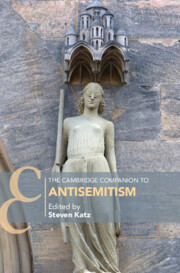Book contents
- The Cambridge Companion to Antisemitism
- Cambridge Companions to Religion
- The Cambridge Companion to Antisemitism
- Copyright page
- Contents
- Contributors
- Acknowledgments
- Introduction
- Part I The Classical Period
- Part II Medieval Times
- Part III The Modern Era
- 15 Martin Luther and the Reformation
- 16 The Enlightenment and Its Negative Consequences
- 17 Modern Antisemitism in Western Europe
- 18 Antisemitism in Late Imperial Russia and Eastern Europe through 1920
- 19 Marxism, Socialism, and Antisemitism
- 20A Antisemitism in Modern Literature and Theater
- 20B Antisemitism in Modern Literature and Theater
- 20C Antisemitism in Modern Literature and Theater
- 21 Antisemitism in America, 1654–2020
- 22 Antisemitism in the Weimar Republic and the Third Reich
- 23 New Islamic Antisemitism, Mid-19th to the 21st Century
- 24 Anti-Zionism as Antisemitism
- 25 New Issues
- 26 Antisemitism in Social Media and on the Web
- 27 Theories on the Causes of Antisemitism
- Appendix The International Holocaust Remembrance Alliance: Working Definition of Antisemitism
- Index
- Cambridge Companions to Religion
- References
20C - Antisemitism in Modern Literature and Theater
English Literature
from Part III - The Modern Era
Published online by Cambridge University Press: 05 May 2022
- The Cambridge Companion to Antisemitism
- Cambridge Companions to Religion
- The Cambridge Companion to Antisemitism
- Copyright page
- Contents
- Contributors
- Acknowledgments
- Introduction
- Part I The Classical Period
- Part II Medieval Times
- Part III The Modern Era
- 15 Martin Luther and the Reformation
- 16 The Enlightenment and Its Negative Consequences
- 17 Modern Antisemitism in Western Europe
- 18 Antisemitism in Late Imperial Russia and Eastern Europe through 1920
- 19 Marxism, Socialism, and Antisemitism
- 20A Antisemitism in Modern Literature and Theater
- 20B Antisemitism in Modern Literature and Theater
- 20C Antisemitism in Modern Literature and Theater
- 21 Antisemitism in America, 1654–2020
- 22 Antisemitism in the Weimar Republic and the Third Reich
- 23 New Islamic Antisemitism, Mid-19th to the 21st Century
- 24 Anti-Zionism as Antisemitism
- 25 New Issues
- 26 Antisemitism in Social Media and on the Web
- 27 Theories on the Causes of Antisemitism
- Appendix The International Holocaust Remembrance Alliance: Working Definition of Antisemitism
- Index
- Cambridge Companions to Religion
- References
Summary
The founding fathers of English literature, Chaucer and Shakespeare, bequeathed a range of possible attitudes to Jews and Judaism. These can be found in the ambivalent figure of “the Jew” – malign and benign, medieval and modern – in much 19th- and 20th-century English literature, from the romantic poets to imperial writers, and from realist novelists to modernist writers of all kinds. The essay contextualizes these changing attitudes and ends with Graham Greene, George Orwell, and Margaret Drabble.
- Type
- Chapter
- Information
- The Cambridge Companion to Antisemitism , pp. 377 - 391Publisher: Cambridge University PressPrint publication year: 2022



